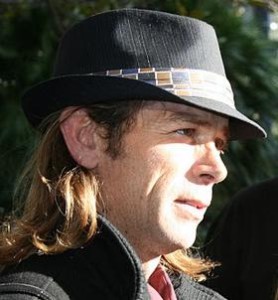 Nathan Archer needs your support, lets pack the courtroom!
Nathan Archer needs your support, lets pack the courtroom!
By: Eugene Davidovich
January 26, 2010 – Department 12
San Diego Superior Court
220 W. Broadway San Diego, CA 92101
As part of the ongoing war against medical marijuana in San Diego waged by the District Attorney Bonnie Dumanis, Nathan Archer was arrested in 2006 and charged with cultivation of 98 plants and 1.7 pounds of dried cannabis.
Nathan who suffers from chronic pain as a result of a past injury, was cultivating the medicine for himself as well as four other patients.
In Nathan Archer’s case, Superior Court Judge Kerry Wells used SB420 numerical plant limits to instruct juries on both the cultivation charge, and possession. As a result Nathan Archer was convicted on all 4 counts.
In a later decision by the 4th Distirct Court of Appeal, a part of the ruling was reversed that had to do with the plant limits, as the court found that the limits were unconstitutional and that the state constitution does not allow the legislature to amend voter initiatives, unless the initiative itself expressly allows it.
Archer’s cultivation conviction stands, and Mr. Archer is being forced to register as a Drug Offender. He has refused to register as such and as a result is threatened with having his bail revoked. On December 15th of 2009, Judge Szumovski allowed Nathan to hold off on registering as a drug offender while part of his case is on appeal, on January 26, Nathan goes back in front of Judge Szumowski.
He is ordered to appear in San Diego Superior Court on December 15th at 9am in Department 12 for a Bail Revocation Hearing.
Below is an article from the union tribune, detailing Mr. Archer’s case and historic 4th District Appellate Court Decision:
__________________________________________________________
More from the medical marijuana front
By Greg Moran
Thursday, November 19, 2009 at 6:44 p.m.
In 2006, San Diego police found 98 marijuana plants and 1.7 pounds of dried herb in Nathaniel Archer’s home. Archer was a medical marijuana patient (chronic pain from a construction accident)who said he was growing for himself as well as four others. Didn’t go over with a jury, which convicted him of both counts. But on Tuesday the 4th District Court of Appeal in San Diego reversed part of that verdict in a ruling that Archer’s lawyer said could have broad application for how medical marijuana cases in the future.
Some background, first. Voters passed Proposition 215 in 1996, allowing medical uses for pot. in 2003, the legislature passed something called the Medical Marijuana Program Act (MMPA), which among other things set out numerical limits on how much pot one could legally possess, for medicinal purposes only, as they say. The limits were 12 immature plants, six mature plants, and eight ounces of gage. In Archer’s trial Superior Court Judge Kerry Wells used those numerical limits to instruct juries on both the cultivation charge, and possession.
But in the decision penned by Justice Patricia Benke, that’s a no-no. Why? Well, the state constitution does not allow the legislature to amend voter initiatives, unless the initiative itself expressly allows it. Prop 215 (not surprisingly) did not open that door for legislators. What’s interesting is that the Attorney General, handling the appeal, conceded that the numerical limits of the MMPA are unconstitutional.
That might not be as big a thing as it sounds. The state Supreme Court has a case in front if it dealing with the same issue, and most expect the court to come to the same conclusion. So maybe the 4th is a bit ahead of the curve here.
But Russell Babcock, the attorney for Archer, said the decision also means that the determination of how much marijuana is enough (for medicinal purposes only) will now be largely left up to jurors. That’s because Benke said with the numerical limits portion of the law inapplicable, the only guideline comes from another section which said the amount of marijuana that could be possessed was whatever was enough for the “personal medical use” of the patient. Courts have interpreted that to mean whatever is “reasonably related” to the patent’s medical needs. Archer went through about a half-pound of marijuana per month (!!!!), according to testimony at the trial. But there was no evidence that he used that for anything other than his personal medical needs, and whether or not that amount is reasonable is a question of fact that juries should decide.
“This has real ramifications,” Babcock said. “It becomes a case by case basis for juries of reasonableness.”
Archer’s cultivation conviction stands, because he failed to qualify as a caregiver under the new standards the state Supreme Court articulated in the Mentch case last year. (Two medical marijuana patients testified at trial that Archer was their caregiver, and he said he was growing for two others who he didn’t identify). But the possession conviction is gone. And it also means that prosecutions based simply on the number of plants are probably a thing of the past, at least according to Babcock.





